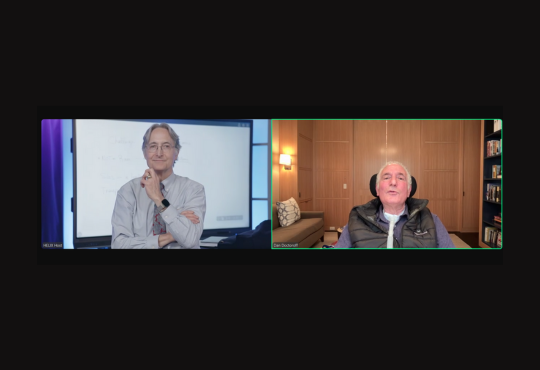Leading with Urgency: Applying a City Leader’s Blueprint for Innovation to Medical Research

Participants in an interactive session explore collaboration as a key approach for taking on and solving complex problems
Cambridge, Massachusetts (March 28, 2025) – Can leadership lessons be drawn from the cutting edge of medical research, where scientists work to speed progress for people facing devastating and often fatal diseases? At a Bloomberg Center for Cities at Harvard University session with Dutch Leonard, the Eliot I. Snider and Family Professor of Business Administration at Harvard Business School and George F. Baker, Jr. Professor of Public Sector Management at Harvard Kennedy School, attendees explored this question through a teaching case about Dan Doctoroff and Target ALS, a foundation that aims to accelerate amyotrophic lateral sclerosis (ALS) research by addressing structural challenges in funding, collaboration, and drug development.
The new teaching case, written by Pamela Varney with faculty lead and Center affiliate Linda J. Bilmes, Daniel Patrick Moynihan Senior Lecturer in Public Policy at Harvard Kennedy School, delves into Doctoroff’s background and professional accomplishments to explore leadership under urgent and high-stakes conditions.
HKS Case Program
Doctoroff is no stranger to daunting challenges. As New York City’s Deputy Mayor for Economic Development under Mayor Michael Bloomberg, he led major city projects including the development of Hudson Yards and Governor’s Island, the expansion of affordable housing, and a large-scale environmental sustainability plan—initiatives that required overcoming bureaucratic inertia, harnessing teams, forging partnerships, and driving results.
“The case captures how Dan created excitement and drove a vision as Deputy Mayor that spurred collaboration and innovation, bringing out the best in all of us,” said David Margalit, executive director of the Bloomberg Center for Cities at Harvard, who worked for Doctoroff in New Yok City Hall. “Dan’s approach and impact at Target ALS, in addition to being a source of hope and inspiration, provides us the opportunity to learn from his leadership yet again.”
For Doctoroff, the fight against ALS is personal. ALS is a fatal neurodegenerative disease that progressively robs individuals of their ability to move, speak, and breathe. There is no cure, and most patients die within three to five years of diagnosis. After watching his father and uncle succumb to the disease, Doctoroff launched Target ALS in 2013 to accelerate ALS research. Then, in 2021, he was diagnosed with ALS himself. The vision, collaboration, and momentum he once applied to city-building became central to his approach with Target ALS.
The Target ALS leadership model is built on observation and analysis, thoughtful design, and novel approaches to collaboration. It has helped unite fragmented efforts across academia and industry, bridge the gap between scientific discoveries and clinical trials, collected data more inclusively, and pursued new funding strategies to prompt innovation.
Through their lively discussion, participants at the event drew broader lessons from Doctoroff’s leadership—his ability to mobilize stakeholders and doggedly seek results. His story demonstrates how urgency and strategic action can drive momentum even under complex conditions.


